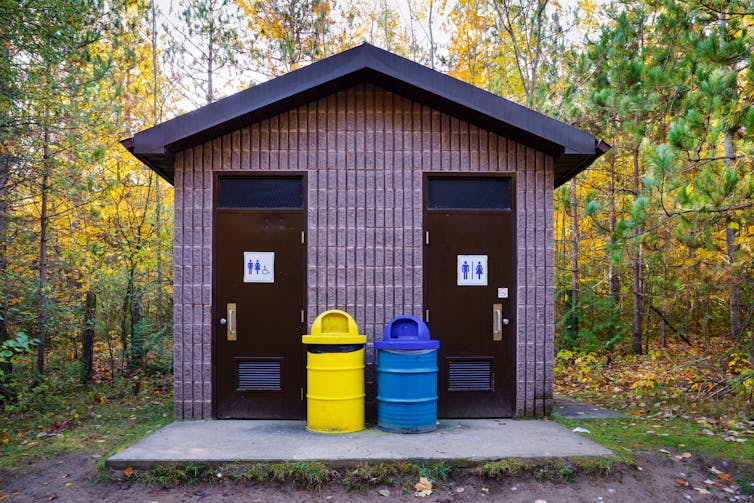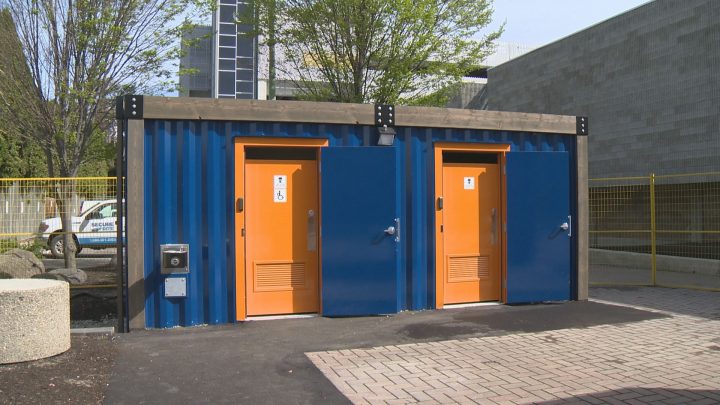In early June in our home city of Guelph, Ont., thousands marched to support the Black Lives Matter movement in the wake of George Floyd’s killing in the United States and the death of Regis Korchinski-Paquet in Toronto. But where did protesters who needed to use the washroom go? We don’t know.

Guelph, like many Canadian cities, had few open public washrooms in the first phase of the pandemic. The libraries, community centres and municipal buildings that house public washrooms were closed to the public (though as of late June there is some limited reopening in Guelph.)
READ MORE: When nature calls — How safe are public washrooms in the coronavirus pandemic?
From May’s now-infamous impromptu summer party in Toronto’s Trinity Bellwoods Park to Black Lives Matter protests in June, there are serious challenges when large groups of people gather during a pandemic. These gatherings magnify existing problems with urban public space.
At the Trinity Bellwoods party, almost all tickets issued were for public urination or defecation. As researchers at the University of Guelph who study public spaces, we were struck by the irony of handing out these tickets when public washrooms and businesses weren’t open. There was literally nowhere for people to go. Where we go when we really need to go is not something people like to talk or think about when they’re in public spaces.
Finding a public washroom
Even in the best of times, public availability of washrooms is limited and often heavily restricted. Public health experts say that public washrooms are no more dangerous than any other enclosed space for COVID-19, and recommend leaving them open. But the already limited public washrooms in many cities remain closed, with some exceptions.
Public space and public washrooms are two fundamental public goods. Research shows people who need to use the washroom when they’re out and about in Toronto rely on the kindness of private business owners or the blind eye that their employees often turn.

Get daily National news
Truly public spaces are those that are freely accessible to all. Public spaces that don’t have public washrooms are neither free nor accessible. Public spaces are diminished by poor investments in the amenities (like washrooms) that make being in public possible. Investing in washrooms, especially during a public health crisis, means paying people to clean them.

We don’t often see the burden that cleaning up public washrooms, and dealing with the occasional health crises that happen in them, puts on minimum wage workers. Frontline workers in restaurants and grocery stores are being celebrated during the pandemic but not rewarded with permanent wage increases and job security.
As businesses open up again with tighter social distancing rules, it will be these same low-paid workers who keep businesses going and are tasked with protecting themselves and customers — all while enforcing unfamiliar rules. And while there’s a playful squeamishness associated with public washrooms, they are nonetheless essential public service.
READ MORE: The New Reality – where do you go when the bathrooms are closed?
Free to pee, free to be
Maintenance — specifically the hiring of well-paid city workers with appropriate protective gear — is a crucial part of making public washrooms work. During our research, we noticed that many of Toronto’s park washrooms were closed at odd times, often pervasively. The insufficient maintenance and cleaning of these spaces means that they fall into disrepair and cannot be used, where they do exist.
Instead of stepping up maintenance, however, the city opted for bylaw enforcement patrols to encourage social distancing and make sure no one pees where they shouldn’t. Policing washroom use likely determines who feels able to show up at both parties and protests.

Knowing that public washrooms are closed, people who need to frequently use the washroom might not participate in public gatherings because of a lack of access to these facilities. And the possibility of incurring a ticket for public urination may bring protesters in contact with law enforcement when, as the Black Lives Matter movement continues to highlight, encounters between Black people and law enforcement can be fraught, and all-too-often, deadly. Indigenous people too are deeply familiar with this pattern.
A comprehensive system of open, accessible public washrooms should be part of how we think about reorganizing urban public spaces after the pandemic. We need to think about how people are excluded from public space because of the lack of public washrooms, how responsibility for maintaining existing limited resources falls to low-paid, often precarious workers, and how routine involvement with law enforcement is much more dangerous for some people.
The washroom dilemma requires more investment. Why? Because having more free and accessible public washrooms is not just the right thing to do, it’s the necessary thing to do.Edith Wilson, Master’s of Sociology, University of Guelph and Mervyn Horgan, Associate Professor of Sociology, University of Guelph
This article is republished from The Conversation under a Creative Commons license. Read the original article.







Comments